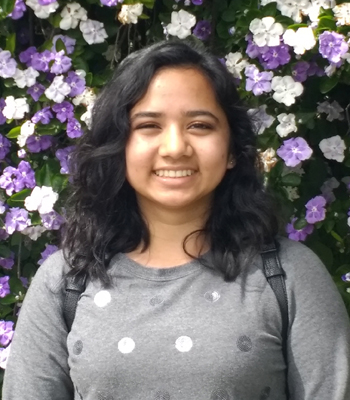Interview with Monica Gonugunta
UCSD Psychology BS ’18 with Specialization in Social Psychology and a Minor in Business (emphasis in Organizational Behavior), attending Master of Business Administration program, Rady School of Management at UCSD
1. What did applying to graduate school involve?
I only applied to business schools, because I planned to get my MBA (Master of Business Administration). The first step is taking the GRE and/or the GMAT, though the GMAT is the main exam that business programs tend to look at. It was also much easier than the GRE, in my opinion. It is also a good idea to attend MBA fairs in order to meet admissions’ committee members from potential universities.
2. Can you provide a general timeline of how the application process went?
I took both the GRE and GMAT in August of 2017, before beginning my 3rd and final year at UCSD. I then proceeded to research schools and narrow down my list of potential programs. During Fall quarter of 2017, I attended a few MBA fairs and networking events (mostly at Rady) in San Diego and spoke to admissions faculty from different universities. I reached out to a few people for letters of recommendation around late November, early December, once I finalized my list of potential schools and corresponding application deadlines. I also filled out all of the applications except for the essays and updated my resume and LinkedIn profile. I worked on my application essays throughout January and had all of my applications submitted by the end of the month. My recommendations were submitted soon
3. Were there any resources that you relied on that were especially helpful in the application process? Were there any persons that helped you especially?
Attending MBA fairs is extremely helpful because you can learn more about the admissions process and directly speak to admissions’ staff from potential universities, and also allows you to find schools to apply to. I attended the QS World MBA Tour when they were in San Diego, and they have MBA fairs all over the US that people can attend. Their website is also helpful for looking at possible schools, as well as the GMAT website. These sites let you filter out programs based on the criteria you want to focus on, and you can bookmark different schools for later review. I would also suggest looking around with Google to find possible fellowships and scholarships, and many universities provide application fee waivers for attending info sessions and events (both online and in person).
Resume workshops are also helpful, especially if you have never made a resume before (if this is you, know that you’re not alone). Many clubs on campus hold resume and interview workshops. The Career Center provides these as well, and even offers mock interviews for additional preparation. Take advantage of these resources, especially if you don’t really know what you’re doing. It’s a good idea to discuss your career options and proposed graduate school plans with your academic advisors and advisors in the Career Center as well, just so you can get some advice on whether or not your plans are the best fit for your future goals.
4. Did you have to be interviewed, and if so, what were the interviews like?
I did have to be interviewed. I attended my Rady interview in person (since I live here), but the rest of my interviews were done online through video chat. The interview length and content will differ from school to school. It really depends on the school and what they are looking to glean from the interview.
The most prominent question was why I wanted to get an MBA now, straight after completing my bachelor’s degree, instead of working for a few years and then going back to school. Other questions I generally received
5. Did you have to take any additional classes beyond those required for your major, in order to qualify for the programs you applied to?
I was not required to take any additional classes, most likely because of my minor in business. I would advise students considering a career in business taking a few classes at Rady, just to familiarize themselves with the field and the different career paths they could take. The new Business Psychology major will be especially useful for any psychology students that want to go further into
6. Are there any other tips that you would offer to students that are considering applying for the same programs that you applied (and were accepted) to?
My best advice would be to take advantage of cool opportunities that come your way, even if it doesn’t appear to be directly “psychology-related”. I have a lot of different experiences on my resume that I took part in just because they were interesting to me. For example, I scored an internship at a small gaming company because I loved their mobile games and decided to reach out to them. I was placed in their writing department, where I worked on game scripts and simultaneously helped with the social media and marketing team. I was able to combine my coding skills with my creative writing skills, all while learning about the role social media has in marketing. It made me realize that I want to specialize in digital marketing after I complete graduate school, and this
7. What would you attribute your success in graduate applications to?
I think my success was mostly related to my variety of experiences and
